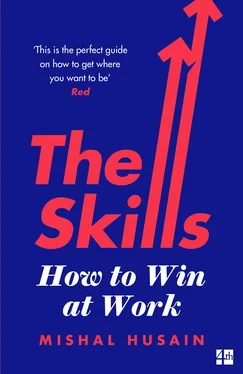Then came what I now think of as the middle phase of my career, coinciding with an intense period in my personal life – twenty months after the birth of my first son, I had twin boys. Returning to work after my second maternity leave was all about keeping the show on the road – life needed to be as simple and manageable as possible, in order to meet the needs of the family and keep my hand in at work. As the domestic rhythm became a little more settled and just a little less intense, however, I started to wonder what the next stage of my career could involve. Radio 4 had been a companion to my life from the age of seventeen – when a wise person advised me that listening to it would be good preparation for university interviews – and I knew I would love to work there one day. But I had no experience in radio production or reporting, let alone presenting on this medium. The only way I could gain valuable experience and get my voice on air would be to use my days off to do occasional shifts, filling in on news and other factual programmes in the hope that it might stand me in good stead for any future opportunities.
None appeared to be forthcoming, though, and this was an odd and often disheartening time – making ad-hoc appearances on unfamiliar programmes, wondering if I was in danger of becoming a jack-of-all-trades. What motivated me to keep going was the strong sense that I had but one life to see how far I might progress – I didn’t want to look back later and wish I had tried a bit harder. I realised, however, that the speed with which my career had taken off when I started presenting on television meant that opportunities had come my way without me having to push for them. I had got used to that, and I was now lacking an essential skill: being able to make a pitch for myself. I went to see one BBC editor after another, asking if they might try me out, but I found myself struggling with straightforward questions about what I wanted to do. In my quest not to come across as unrealistic or full of myself, I failed to have compelling answers that were true to who I was and where I wanted to go in my career.
Over time, there were some valuable lessons: I learned to hone in advance exactly how I wanted to use each meeting and be clear about what I was asking for; to be ready to turn my energies towards a new avenue if the first one didn’t work out; to keep an open mind and explore multiple options, even though that sometimes felt overwhelming; to do my best to express my hopes and ambitions without apology or diffidence – even if it felt excruciating at some moments and pushy at others. From there I started to think about nurturing a set of skills that might be relevant to career troughs as well as peaks, adaptable to different settings and transferable even in the event of a complete career change. Every projection about the future of work suggests that mobility will be increasingly important – perhaps the disruption will even bridge some of the workplace gender gaps we see today, if it becomes more common for men and women to shift gear, go part-time or take time out for family reasons.
Today, when I contrast my experience of working life with that of my mother, I feel a deep gratitude. For all the emphasis on education in my family, the idea that it could be used to forge a career and for that career to exist alongside motherhood, is a novel one. My mother gained two degrees in Pakistan and became a producer at Pakistan Television when it was first set up in the 1960s. But all around her it was accepted that marriage and motherhood were more than likely to bring a career to an end. After her marriage brought her to the UK in 1972, I was born in 1973 and became her full-time job. She told me years later that there were times when she would watch the Asian programming coming out of the BBC in Birmingham and long to be a part of it, to use her experience and have an identity in this new country beyond that of wife and mother. It was never going to be possible; my father was working long hours as an NHS doctor in Northamptonshire and Bedfordshire and any family members who might have helped out were far away. Childcare and travel costs would have been an unjustifiable addition to an already tight household budget.
It is not in my mother’s nature to be bitter about what might have been, but her experience reminds me not to lose an appreciation of the doors that have been open to me, one generation on. Changed attitudes to women and to ethnic minorities have both played a key role in my life chances – not so long ago it would have been hard to imagine someone with a name like mine fronting a national news programme. That is not to say that I find my own combination of motherhood, marriage and work easy – or even always manageable. I often think back to what I heard the then head coach of UK Athletics, Charles van Commenee, say just ahead of the London Olympics. Having coached many athletes to medals, he said he always tried to make them appreciate that pressure would be an ongoing part of their lives. ‘I tell them – it’s uncomfortable out there,’ he said. The words resonate with me because alongside the many privileges of my job are the difficult aspects – in particular the scrutiny. I cannot have one without accepting the other, and I have but this one life to make the most of what comes my way.
Each generation must create its own reality and find its own identity
Camille Paglia
If I feel fortunate to have been born in a time when my opportunities have been so much greater than my mother’s, it is also true that the advancement of women has not reached the point I would have imagined it might when I left university in 1995. By then, both the UK and my parents’ country of origin, Pakistan, had elected female prime ministers and, if asked, I would have said that spoke volumes about change and progress.
More than twenty years on, I now see that while we owe a great deal to those who smashed glass ceilings and led the way, the follow-up – assuming there is one – is vital. It was Norway’s Erna Solberg, the second woman to be elected prime minister of her country, who brought this home when she told me why she likes the ‘second woman’ tag: ‘It means the first was not a one-off.’ Even her country, known for being one of the most gender-equal in the world, has not reached a fifty-fifty split in Parliament – although with 41 per cent women, it is still doing better than most.1 In India, women make up only 12 per cent of the Lok Sabha, or lower house of Parliament, while in China a woman has never sat on the Communist Party’s most powerful decision-making body, the Politburo Standing Committee.2
Interestingly, the picture for Chinese business is considerably better, with women holding 31 per cent of senior leadership roles. It’s a proportion matched in Africa and exceeded in Eastern Europe, but higher than businesses in the European Union (27 per cent) and in North America (21 per cent).3 Notably, the study by Grant Thornton International found that those countries with the most policies in place to promote equality – equal pay, parental leave, flexible working – were not necessarily those with the greatest diversity at the top of business. Policy alone was not producing large scale change, they said, while stereotypes about gender roles were still a barrier to progress. That is a conclusion that perhaps makes clearer where the focus for my generation and younger women should lie – we need to think about individuals as well as institutions.
We can take heart, however, from studies that have compared companies’ records on diversity and their performance – one analysis of more than 20,000 firms in 91 countries found that the presence of women in corporate leadership correlated positively with profitability.4 Another, from consultants at McKinsey, reported that a correlation between gender and ethnic diversity and financial performance generally holds true across geographies. While they couldn’t say that one caused the other, they observed a ‘real relationship between diversity and performance’ and said the reasons for it would include ‘improved access to talent, enhanced decision making and depth of consumer insight and strengthened employee engagement and licence to operate’.5
Читать дальше












